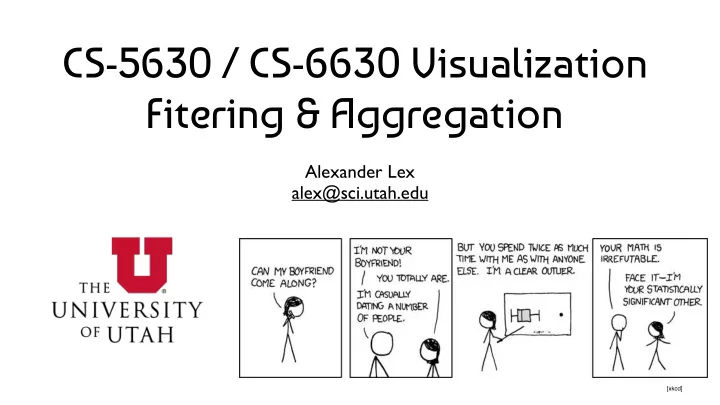

CS-5630 / CS-6630 Visualization Fitering & Aggregation Alexander Lex alex@sci.utah.edu [xkcd]
Administrativa
Project Assigned a primary and a consulting TA All project feedback coordinated between them Primary is your point of contact, keep consulting in the loop You can set up meetings Homework 5 feedback by Friday Nov 16-Nov 20 — Mandatory meeting with TA
Filter & Aggregate
Filter elements are eliminated What drives filters? Any possible function that partitions a dataset into two sets Bigger/smaller than x Fold-change Noisy/insignificant
Dynamic Queries / Filters coupling between encoding and interaction so that user can immediately see the results of an action Queries: start with 0, add in elements Filters: start with all, remove elements Approach depends on dataset size
Ahlberg 1994
ITEM FILTERING Ahlberg 1994
NONSPATIAL FILTERING
Scented Widgets information scent: user’s (imperfect) perception of data GOAL: lower the cost of information foraging through better cues Willett 2007
Interactive Legends Controls combining the visual representation of static legends with interaction mechanisms of widgets Define and control visual display together Riche 2010
Aggregation
Aggregate a group of elements is represented by a (typically smaller) number of derived elements
Item Aggregation Histogram number of students score
Histogram # passengers Good #bins hard to predict make interactive! age rule of thumb: #bins = sqrt(n) 10 Bins # passengers age 20 Bins
Density Plots http://web.stanford.edu/~mwaskom/software/seaborn/tutorial/plotting_distributions.html
Box Plots aka Box-and-Whisker Plot Show outliers as points! Not so great for non-normal distributed data Especially bad for bi- or multi- modal distributions Wikipedia
One Boxplot, Four Distributions http://stat.mq.edu.au/wp-content/uploads/2014/05/Can_the_Box_Plot_be_Improved.pdf
Notched Box Plots Notch shows m +/- 1.5i x IQR/sqrt(n) A guide to statistical significance. Kryzwinski & Altman, PoS, Nature Methods, 2014
Box(and Whisker) Plots http://xkcd.com/539/
Comparison Streit & Gehlenborg, PoV, Nature Methods, 2014
Violin Plot = Box Plot + Probability Density Function http://web.stanford.edu/~mwaskom/software/seaborn/tutorial/plotting_distributions.html
Showing Expected Values & Uncertainty NOT a distribution! Error Bars Considered Harmful: Exploring Alternate Encodings for Mean and Error Michael Correll, and Michael Gleicher
Heat Maps binning of scatterplots instead of drawing every point, calculate grid and intensities 2D Density Plots
Continuous Scatterplot Bachthaler 2008
Hierarchical Parallel Coordinates Fua 1999
Spatial Aggregation modifiable areal unit problem in cartography, changing the boundaries of the regions used to analyze data can yield dramatically different results
A real district in Pennsylvania Democrats won 51% of the vote but only 5 out of 18 house seats
Valid till 2002 http://www.sltrib.com/opinion/ 1794525-155/lake-salt-republican- county-http-utah 31
Voronoi Diagrams Given a set of locations, for which area is a location n closest? D3 Voronoi Layout: https://github.com/mbostock/d3/wiki/ Voronoi-Geom
Constructing a Voronoi Diagram Calculate a Delauney triangulation Voronoi edges are perpendicular to triangle edges. http://paulbourke.net/papers/triangulate/
Delauney Triangulation Start with all-encompassing Outer edges of triangles form fake triangle polygon, delete all inner edges For existing triangles: check if Create triangle connecting all circumcircle contains new point outer edges to new point.
Sidenote: Voronoi for Interaction Voronoi Examples
Attribute aggregation 1) group attributes and compute a similarity score across the set 2) dimensionality reduction, to preserve meaningful structure
Attribute aggregation 1) group attributes and compute a similarity score across the set 2) dimensionality reduction, to preserve meaningful structure
Attribute aggregation 1) group attributes and compute a similarity score across the set 2) dimensionality reduction, to preserve meaningful structure
Clustering Classification of items into “similar” Hierarchical Algorithms bins Produce “similarity tree” – Based on similarity measures dendrogram Euclidean distance, Pearson Bi-Clustering correlation, ... Clusters dimensions & records Partitional Algorithms Fuzzy clustering divide data into set of bins # bins either manually set (e.g., k- allows occurrence of elements means) or automatically determined in multiples clusters (e.g., affinity propagation)
Clustering Applications Clusters can be used to order (pixel based techniques) brush (geometric techniques) aggregate Aggregation cluster more homogeneous than whole dataset statistical measures, distributions, etc. more meaningful
Clustered Heat Map
F+C Approach, with Dendrograms [Lex, PacificVis 2010]
Cluster Comparison
Aggregation
Example: K-Means Pick K starting points as centroids Calculate distance of every point to centroid, assign to coaster with lowest value Update centroid to the mean of cluster Repeat
K-Means Properties Have to pick K Assumptions about data: roughly “circular” clusters of equal size http://stats.stackexchange.com/questions/133656/how-to-understand-the-drawbacks-of-k-means
K-Means Unequal Cluster Size http://stats.stackexchange.com/questions/133656/how-to-understand-the-drawbacks-of-k-means
Attribute aggregation 1) group attributes and compute a similarity score across the set 2) dimensionality reduction, to preserve meaningful structure
Dimensionality Reduction Reduce high dimensional to lower dimensional space Preserve as much of variation as possible Plot lower dimensional space Principal Component Analysis (PCA) linear mapping, by order of variance
PCA
PCA Example – CS 171 Project 2013 http://mu-8.com/ [Mercer & Pandian]
Multidimensional Scaling Nonlinear, better suited for some DS Multiple approaches Works based on projecting a similarity matrix How do you compute similarity? How do you project the points? Popular for text analysis [Doerk 2011]
Can we Trust Dimensionality Reduction? Topical distances between departments in Topical distances between the selected a 2D projection Petroleum Engineering and the others. [Chuang et al., 2012] http://www-nlp.stanford.edu/projects/dissertations/browser.html
Probing Projections http://julianstahnke.com/probing-projections/
MDS for Temporal Data: TimeCurves http://aviz.fr/~bbach/timecurves/
Recommend
More recommend